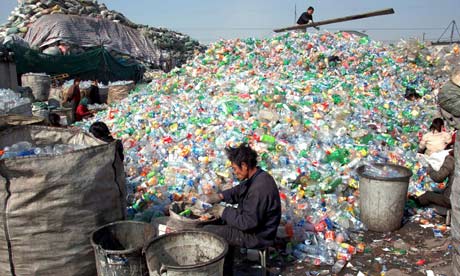Wenan County, known as China's "capital of plastic waste," is located in Langfang of northern Hebei Province. Over the years residents there have profited heavily from plastic recycling and processing, but the environmental pollution behind its so-called "recycling economy" is taking a toll, according to a Southern Metropolis Daily report on June 29.
From farmers to recyclers
"Local residents in Wenan are not engaged in farm work any more," Yang Yongjin, an immigrant from adjacent Henan Province told the reporter. Croplands have made way for plastic recycling and processing workshops, which can be seen nearly everywhere. Most of them are 30-square-meter courtyards containing one or two machines that roughly process discarded plastic.
Local residents have given the industry deceptively wholesome names such as "recycling economy" or "sustainable economy."
The history of Wenan's plastic recycling business can be traced back to the 1980s. "At first villagers brought back free plastic waste from Tianjin and Beijing, and then sold it right after they had sorted it," according to 50-year-old local villager Dong Anyi, who has witnessed the growth of the business from the start. "They began processing plastic at the end of the 1990s, using farm vehicles to collect and move the trash. Ten years later, almost all the families had become experts in the business."
After 30 years of development, Wenan’s waste plastic industry has become comprehensive. "Almost half of the villages and towns here are in the business, with the rest engaged in other kinds of recycling, such as newspaper and non-ferrous metal recycling," Dong told the reporter.
"Families with less money only do simple processing, such as sorting and smashing, but those with more money also produce plastic products," Zhao Shibin, another local man, told the Southern Metropolis Daily. "We can produce anything, from plastic bags and buckets to air conduits for automobiles and petroleum pipelines."
Half of trash imported
At the ten open-air garbage dumps outside one village, members from various NGOs found a variety of plastic waste, including medical devices, television parts, plastic bags and KFC ketchup packets. "They are not English, but German," said Mao Da, a doctor from Beijing Normal University, as he pointed at the characters on a package.
Half of the plastic waste comes from China's northern ports. About seven or eight years ago, batches of foreign plastic rubbish were imported from northern China's Tianjin and Dalian ports and then transported to Wenan. "We cannot understand foreign languages, but we will accept them if there is profit," said a villager.
The domestic price of high pressure polythene reached 7,000 yuan ($1,083) per ton in 2004, but the price of renewable granular materials was only 3,800 yuan ($588). It was the huge profit margin that boosted large-scale imports of foreign plastic waste.
According to official statistics, China imported 5.53 billion tons of plastic waste in January of 2010, an increase of 36.7 percent year on year, 79.2 percent of which was imported by private recycling workshops.
"At the beginning, foreigners paid us to transport away their waste plastic, but in the last four or five years we have had to pay them for it, since demand has increased so much for recycled plastic," Zhao Shibin recalled.
Environmental deterioration
Plastic recycling has brought great fortune to local villagers: "At the end of the 1990s, the average annual per capita income was only 4,000-5,000 yuan ($619-$773), but we can earn 40,000-50,000 yuan ($6,191-$7,738) per year now," a villager told the newspaper.
But that fortune has come at the price of a gradually deteriorated environment.
"We have more than 10,000 processing workshops, but we have no sewage treatment plant," Zhao Shibin told the newspaper. "The county's only sewage treatment plant is left unused most of time."
Plastic waste is generally washed using chemicals such as sodium hydroxide and sulfuric acid. 90 percent of the polluted wash water is drained directly to the county's ditches, rivers and croplands.
"Before the recycling industry began to flourish, villagers could get high quality drinking water from 100-meter deep wells," Zhao recalled. Now only water from 300-meter deep wells can be consumed. The deepest well is 500 meters.
"Some richer villagers never drink water pumped from their wells now, they only drink bottled water," Zhao said.
Besides polluted water, villagers have also had to get used to the unpleasant smell of smoke created by burning plastic. "The rubbish is burned seven to eight times a day," according to a local person.
"In recent years, none of the local men could pass the Army entrance test due to liver illness," Dong told the newspaper.
"We hope the government will release policies to lower the pollution and make it a deep processing industry," said Zhao's wife. "We have to move to Baoding because the environment in my hometown has gotten so bad."


















